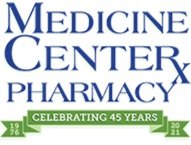Common Skin Conditions with Dr. Garcia-Zuazaga
Health Matters is a weekly radio show sponsored by the Medicine Center Pharmacy on WHBC 1480 AM in Canton, Ohio. This episode pharmacists Brad White and Paul White discuss common skin conditions with Dr Garcia-Zuazaga from Apex Dermatology.
Your skin is your protection. It’s the very first line of defense for anything you come into contact with. For this reason, you should be adamant about maintaining its health. Whether it be skin cancer, acne, eczema or aesthetic concerns, you should never neglect the health of your skin. Today we will talk with Dr. Garcia-Zuazaga about Apex Dermatology and their approach to treating skin conditions.
Listen to the episode on Apple Podcasts, Spotify, Castro, Stitcher, Amazon Music, or on your favorite podcast platform.
Tune in to this episode of Health Matters to learn answers to the following questions:
It seems like getting into a dermatologist as a new patient requires months of waiting, How can you get patients in the same day?
How common is it and what are some of the risk factors that make it more likely to get skin cancer?
If I am looking at a mole and am concerned by its appearance, what should I look for?
How often should someone be screened for skin cancer?
What does the acronym ABCDE mean?
Other than skin cancer, what are some common medical conditions treated at Apex?
Thanks for listening today! We’d like to remind our listeners, if you suspect you have a medical issue, please contact your healthcare provider. Thanks to our sponsors Studio Arts & Glass and Jenior Appraisals and LIquidations. As always, we thank our listeners for joining us on Health Matters with the Medicine Center Pharmacy. Have a healthy week and we’ll see you again next Friday right here on News Talk 1480 WHBC.



Aultman’s Comprehensive Medical Rehabilitation Program is a 60-bed intensive
inpatient rehab unit. Their specially trained and skilled staff will assist you as you
recover from your injury or illness. From Physicians and nurses to dietitians and
social workers the focus is to restore function and improve the overall quality of
life after the illness or injury.